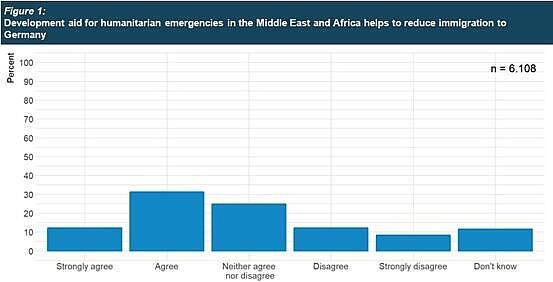News
Development aid will not convince immigration critics

In principle, both immigration critics and supporters of refugee protection could support an increase in development aid to combat the root causes of migration—albeit for different reasons. Whereas immigration critics look for a reduction in refugee numbers, supporters of refugee protection care for the welfare of disadvantaged individuals.
However, "people need to believe in development aid first. Furthermore, aid actually needs to deliver by improving development and reducing migration. Without such results, public support would cease," explains MEDAM researcher Tobias Stöhr. "We found that people are ambiguous about development aid, as well as additional spending to fight root causes of migration. Interestingly, the split is driven more by existing attitudes toward immigration than by party preferences."
Support for development aid linked to attitudes towards immigration
Analyzing survey data on Germany from the Aid Attitudes Tracker-project (AAT), Esther Ademmer and Tobias Stöhr (Kiel Institute for the World Economy), Jens Eger and Sebastian Schneider (German Institute for Development Evaluation), David Hudson (University of Birmingham), and Jennifer van Heerde-Hudson (University College London) explored public opinion toward development aid. Their research findings, published in the Mercator Dialogue on Asylum and Migration (MEDAM)’s latest policy brief, illustrate that immigration critics and supporters hold very different views about whether development aid helps reducing immigration and on whether they would be willing to spend more on it.
The researchers found that individuals with sceptical attitudes toward immigration are much more likely to be sceptical of development aid, too, and that existing attitudes toward immigration are more important drivers of attitudes toward development aid than party preferences.
While 45% of survey respondents generally agreed with the statement that “development aid for humanitarian emergencies in the Middle East and Africa helps to reduce immigration to Germany,” roughly 20% disagreed, and another 25% neither agreed nor disagreed. The remaining were undecided. The survey responses illustrate the strong polarization within German society. The participants were similarly divided about whether the German government should increase development aid.

Source: Own elaboration based on Aid Attitudes tracker, wave 9.
So while policy makers in Europe might have hoped that increasing development aid may be a policy compromise that supporters of all political parties could agree upon, the survey findings show that development aid cannot work as a bridge-builder in the highly polarized debate about immigration. "Development aid alone will not build the necessary common ground needed to overcome the current deadlock in the immigration debate”, says Stöhr. “It will simply not be enough to appease immigration critics."
Further information:
Ademmer, E., and T. Stöhr. 2019. "Comforting immigration critics? Public opinion toward development aid as a tool to reduce refugee inflows to Germany." MEDAM Policy Brief 2019/1 Kiel: Kiel Institute for the World Economy.
Lanati, M., and R. Thiele. 2018. "Development aid can dampen migration if it improves public services." MEDAM Policy Brief 2018/2 Kiel: Kiel Institute for the World Economy.
———. 2018. "How Donors Respond to Refugee Movements." In 2018 MEDAM Assessment Report on Asylum and Migration Policies in Europe, MEDAM (Mercator Dialogue on Asylum and Migration), 109–115. Kiel: Kiel Institute for the World Economy.

